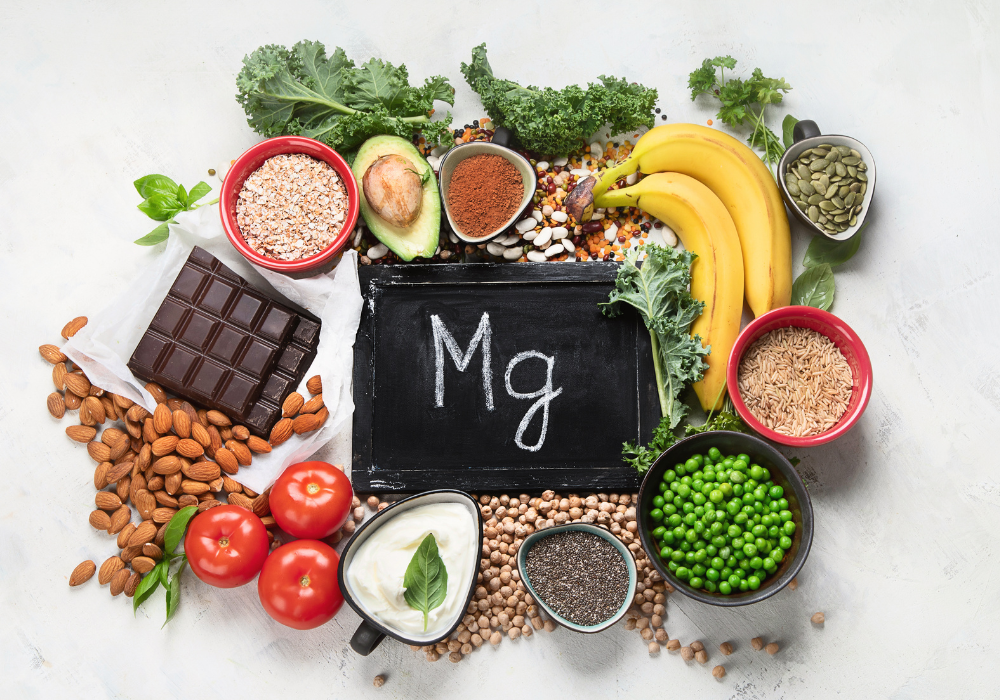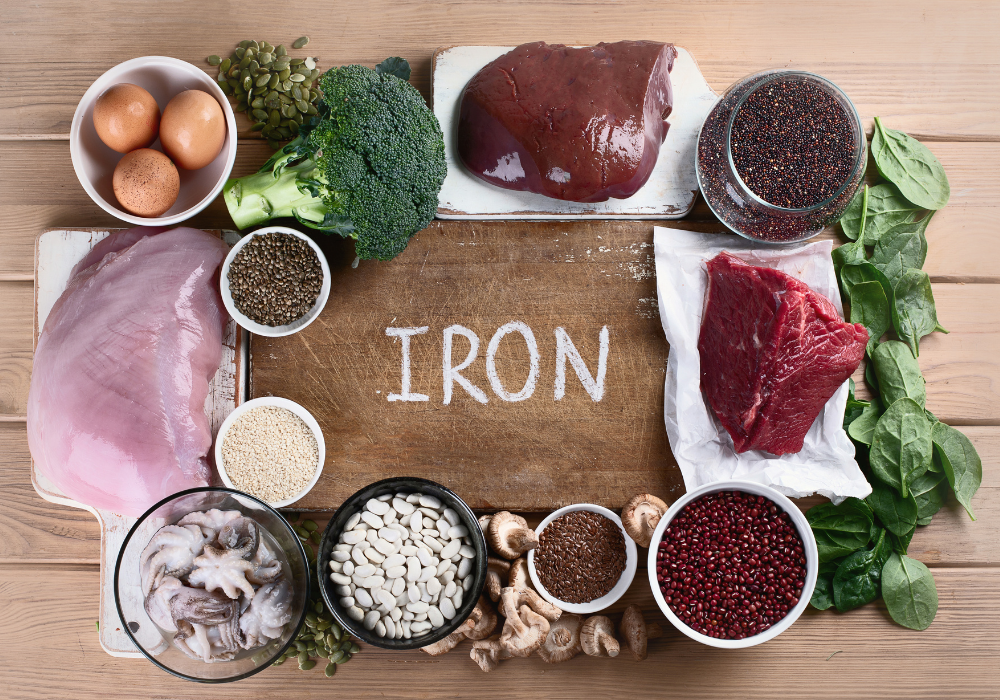What you eat could be quietly fueling your anxiety.

Anxiety is often thought of as a purely psychological condition, a result of stress, trauma, or chemical imbalances in the brain. But emerging research suggests that the roots of anxiety may also lie in the body—specifically, in what we eat (or don’t eat). Nutrient deficiencies, often overlooked in mainstream mental health discussions, can subtly exacerbate feelings of worry, panic, and unease.
For those grappling with anxiety, addressing diet might be just as crucial as therapy or medication. From magnesium and iron to vitamin D, essential nutrients play a powerful role in regulating mood, supporting brain health, and maintaining the body’s stress response. Let’s go over 10 key deficiencies that could be influencing your mental health—and how small dietary changes might bring much-needed relief.
1. Is a lack of magnesium making your anxiety worse?

Struggling with stress? Magnesium plays a pivotal role in calming your nervous system and reducing anxiety. It helps regulate neurotransmitters, the chemical messengers in your brain that influence mood. Research confirms that without adequate magnesium, your body’s ability to manage stress becomes compromised, leading to heightened anxiety levels.
Modern diets, high in processed foods, often lack sufficient magnesium. Adding foods like leafy greens, nuts, and whole grains can help restore balance. Magnesium-rich foods such as pumpkin seeds, black beans, and avocados are also excellent additions. For those with persistent low levels, magnesium supplements may offer additional support, though professional guidance is recommended before starting any regimen.
2. When your mood lacks sunshine: The role of vitamin D.

Lack of sunlight isn’t just a seasonal concern—vitamin D deficiency can quietly influence your mood and cognitive health. This nutrient plays a key role in the production of serotonin, a neurotransmitter that affects feelings of well-being and happiness. Low levels are commonly linked to depression and anxiety, as detailed in a study published in the National Library of Medicine.
While sunlight exposure is the primary natural source, many people—especially those in northern climates—struggle to get enough. Try fortified foods, fatty fish, or vitamin D supplements which can help maintain optimal levels and potentially ease anxiety symptoms. Spending 10-30 minutes in the sun several times a week can also help maintain healthy vitamin D levels, depending on your skin type and location.
3. Feeling drained? Low iron could be the culprit.

Without enough iron, your brain may struggle to get the oxygen it needs for peak performance. Iron supports the production of hemoglobin, which transports oxygen throughout the body. Based on a 2013 study, researchers found that when levels dip too low, it can lead to fatigue, irritability, and heightened feelings of anxiety.
Women, particularly those with heavy menstrual cycles, are at greater risk of iron deficiency. Iron-rich foods or taking iron supplements under medical supervision can help mitigate these symptoms. Consuming foods with a high Vitamin-C count alongside iron can improve absorption, making it easier for your body to utilize this essential mineral.
4. Why your brain needs omega-3s for emotional stability.

These essential fats help stabilize mood and reduce inflammation, supporting overall brain health. Omega-3s are critical for maintaining the fluidity of cell membranes in the brain, which is essential for proper communication between brain cells. Low levels of these fats are linked to an increased risk of anxiety and depression.
Look to foods like salmon, walnuts, and chia seeds to boost your omega-3 intake. For those who struggle to meet their needs through diet alone, high-quality fish oil supplements offer an effective alternative. Regular consumption of omega-3-rich foods has also been associated with improved sleep patterns, which can further alleviate anxiety symptoms.
5. The surprising link between zinc and emotional resilience.

Zinc’s influence on your brain’s stress response often goes unnoticed, but its deficiency can disrupt emotional balance. This mineral supports neurotransmitter function and plays a role in regulating mood. Zinc deficiency can impair brain signaling, contributing to symptoms of anxiety and depression.
Shellfish, legumes, and seeds are excellent sources of zinc. For those who may struggle to meet daily requirements, zinc supplements can help—but should be taken with medical advice, as excessive intake can cause adverse effects. Zinc is also involved in supporting immune health, making it a vital nutrient for overall well-being.
6. Calcium’s hidden role in easing nervous tension.

Beyond bone health, calcium helps regulate nerve activity, reducing muscle tension and improving mood stability. It aids in neurotransmitter release, allowing nerve cells to communicate effectively. Deficiency can result in muscle cramps, irritability, and heightened anxiety.
Restore balance by consuming more calcium-rich foods like dairy products, fortified plant-based milks, and leafy greens. Supplements may be necessary for those with specific dietary restrictions. Additionally, combining calcium intake with adequate vitamin D can enhance absorption and maximize its calming effects on the nervous system.
7. A potassium imbalance could be stirring up anxiety.

When potassium levels drop, symptoms like heart palpitations and anxiety can arise, signaling a deeper imbalance. Potassium plays a vital role in maintaining electrolyte balance, supporting muscle function, and regulating heart rate—all factors that contribute to emotional stability.
Including potassium-rich foods in your diet can also help alleviate muscle cramps and improve hydration levels. Foods such as bananas, sweet potatoes, and avocados are excellent sources of potassium. Regular consumption helps maintain electrolyte balance and supports a calmer nervous system.
8. How low selenium levels heighten your body’s stress response.

This antioxidant powerhouse plays a crucial role in managing oxidative stress and supporting mood stability. Selenium helps reduce inflammation and protect cells from damage, both of which are linked to anxiety symptoms when unregulated.
While supplements are available, it’s easy to meet daily requirements through a balanced diet. Brazil nuts, seafood, and eggs are rich sources of selenium. Regular selenium intake also supports thyroid function, which has a direct impact on mood regulation and anxiety levels.
9. Is your thyroid balance off? Check your iodine intake.

Thyroid health, influenced by iodine intake, has a direct impact on mood and anxiety regulation. Iodine is essential for producing thyroid hormones, which regulate metabolism and influence brain function. A deficiency can lead to hormonal imbalances, fatigue, and heightened stress.
Make sure your diet includes ingredients such as iodized salt, seaweed, and dairy products to help maintain adequate iodine levels. Those with thyroid concerns should consult a healthcare professional before making dietary changes. Proper iodine levels also support cognitive function, ensuring mental clarity and focus throughout the day.
